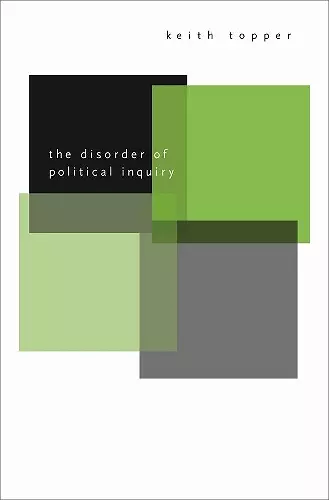The Disorder of Political Inquiry
Format:Hardback
Publisher:Harvard University Press
Published:30th Jul '05
Currently unavailable, and unfortunately no date known when it will be back

This thoughtful and well-informed book casts a great deal of light on the "social science wars": an often fierce struggle over methods and techniques which also reflects profound differences in philosophy among social scientists. Topper shows how close argument and imaginative sympathy can carry the debate forward. This is a lucid and engaging book, full of important insights about the ways in which we try to study society. -- Charles Taylor, author of Sources of the Self: The Making of the Modern Identity This book addresses the persisting "crisis" in political and social science and charts a way out of it. In the context of the latest round of debates about method, it revisits such abiding general questions as the unity or disunity between the natural and social sciences; the peculiar character of social scientific inquiry; the relationship between social science and political practice; and the entanglement of method and power. Topper negotiates his way through this thicket of issues with intelligence and clarity, and in doing so he provides us with many valuable insights into the contemporary situation of political inquiry. -- Thomas A. McCarthy, Northwestern University This is a much-needed book that negotiates its way with great intelligence through a variety of difficult issues in the philosophy of the social sciences. -- Stephen White, The University of Virginia
Engaging the work of thinkers such as Rorty, Taylor, Bourdieu, Bhaskar, and Arendt, and literature in political science and history and philosophy of science, Topper proposes a pluralist, normative, and broadly pragmatist conception of political inquiry, one alive to the notorious vagaries, idiosyncrasies, and uncertainties of political life.
In the past several years two academic controversies have migrated from the classrooms and courtyards of college and university campuses to the front pages of national and international newspapers: Alan Sokal’s hoax, published in the journal Social Text, and the self-named movement, “Perestroika,” that recently emerged within the discipline of political science. Representing radically different analytical perspectives, these two incidents provoked wide controversy precisely because they brought into sharp relief a public crisis in the social sciences today, one that raises troubling questions about the relationship between science and political knowledge, and about the nature of objectivity, truth, and meaningful inquiry in the social sciences. In this provocative and timely book, Keith Topper investigates the key questions raised by these and other interventions in the “social science wars” and offers unique solutions to them.
Engaging the work of thinkers such as Richard Rorty, Charles Taylor, Pierre Bourdieu, Roy Bhaskar, and Hannah Arendt, as well as recent literature in political science and the history and philosophy of science, Topper proposes a pluralist, normative, and broadly pragmatist conception of political inquiry, one that is analytically rigorous yet alive to the notorious vagaries, idiosyncrasies, and messy uncertainties of political life.
This thoughtful and well-informed book casts a great deal of light on the ‘social science wars’: an often fierce struggle over methods and techniques which also reflects profound differences in philosophy among social scientists. Topper shows how close argument and imaginative sympathy can carry the debate forward. This is a lucid and engaging book, full of important insights about the ways in which we try to study society. -- Charles Taylor, author of Sources of the Self: The Making of the Modern Identity
This book addresses the persisting ‘crisis’ in political and social science and charts a way out of it. In the context of the latest round of debates about method, it revisits such abiding general questions as the unity or disunity between the natural and social sciences; the peculiar character of social scientific inquiry; the relationship between social science and political practice; and the entanglement of method and power. Topper negotiates his way through this thicket of issues with intelligence and clarity, and in doing so he provides us with many valuable insights into the contemporary situation of political inquiry. -- Thomas A. McCarthy, Northwestern University
This is a much-needed book that negotiates its way with great intelligence through a variety of difficult issues in the philosophy of the social sciences. -- Stephen White, University of Virginia
- Nominated for Giovanni Sartori Book Award 2006
- Nominated for Foundations of Political Theory First Book Award 2006
- Nominated for David Easton Award 2006
- Nominated for J. David Greenstone Book Prize 2006
- Nominated for Michael Harrington Award 2006
ISBN: 9780674016781
Dimensions: 235mm x 156mm x 25mm
Weight: 635g
336 pages